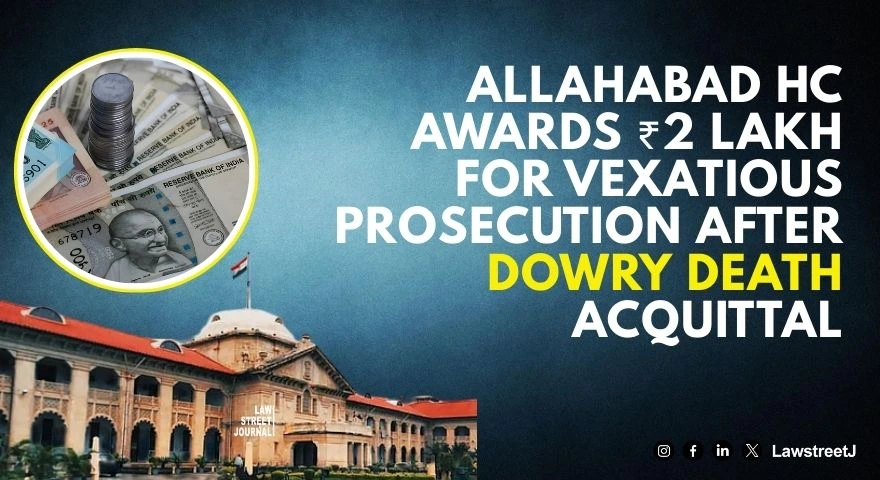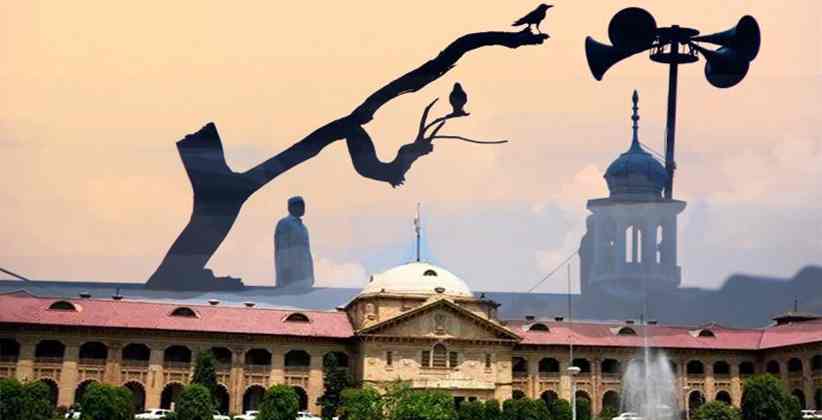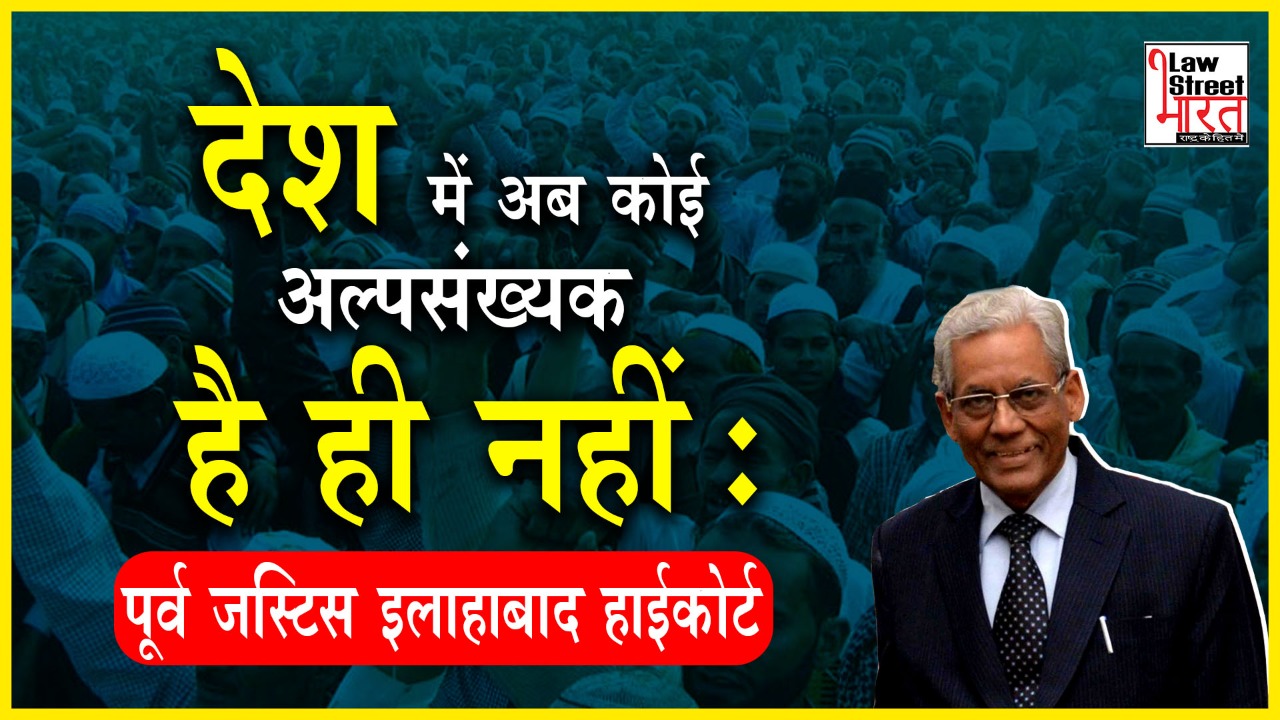Prayagraj: The Allahabad High Court has ordered the State to pay Rs. 2 lakh compensation to a man who was subjected to “vexatious criminal prosecution” when the government challenged his acquittal in a dowry death case, despite clear evidence supporting his innocence, including a suicide note by the deceased absolving him of responsibility.
A bench of Justice Avnish Saxena and Justice Siddharth made these observations in an appeal filed by the State of Uttar Pradesh against Dhirendra Kumar, criticizing the State for filing the appeal without applying judicial mind and for putting an innocent man’s liberty in jeopardy twice.
The case originated from the death of Pinky Kumari, who had married Dhirendra Kumar on July 12, 2021, and was found dead by hanging on March 7, 2022, at their matrimonial home in Sikandrabad. Her brother, Santosh Bihari Kumar, filed an FIR alleging dowry death under Sections 498-A, 304-B, 504, and 506 IPC, and Sections 3 and 4 of the Dowry Prohibition Act.
However, the trial court at Bulandshahr had acquitted Dhirendra Kumar on July 4, 2024, after finding crucial evidence in his favor, particularly a suicide note written by the deceased herself. The suicide note, written on a register page and proved by the prosecution, clearly stated that Pinky was committing suicide due to “study stress” while pursuing her M.Ed third semester from Kumaun University, Nainital.
The High Court noted the key contents of the suicide note, where the deceased had categorically written: “I myself am responsible for the suicide” and specifically stated that “her husband Dhirendra Kumar Jaiswal and her in-laws are not responsible for her death by suicide.” She further wrote that her mother, father, and family members were also not responsible for her death.
The deceased had even appealed to police personnel in the note “not to harass her in-laws and parents for the said suicide,” and mentioned that her husband had taken his mother to Delhi due to her ill health.
Justice Saxena observed that the trial court had rightly acquitted the accused after finding that the prosecution witnesses were “not trustworthy on the point of demand of dowry and cruelty soon before the death.” The court noted several inconsistencies in witness testimonies, including false claims about the deceased being pregnant, which were contradicted by the post-mortem report.
The High Court strongly criticized the State’s decision to file the appeal, observing: “The State Government, before giving direction to the public prosecutor to present an appeal, is under a legal obligation to state in clear words its direction that there are substantial and compelling reasons, good and sufficient grounds, very strong circumstances, distorted conclusions, and apparent mistakes which warrant appeal.”
Justice Saxena further emphasized that appeals against acquittal should be filed “sparingly and with circumspection,” citing various precedents including Public Prosecutor v. Mayandi, which established that “the right of appeal against an acquittal vested in the Crown should be used sparingly and with circumspection.”
The court noted that the State had failed to consider the principle of double presumption in favor of an acquitted person—first, the presumption of innocence under criminal jurisprudence, and second, the reinforcement of this presumption following acquittal by the trial court.
In further observation, Justice Saxena, writing for the bench, stated: “We are of staunch view that the State, before issuing direction to the public prosecutor to present this appeal in case of acquittal, has not applied its judicial mind. Unconsiderate to the fact that life and liberty of the accused, who is enjoying double presumption of his innocence in a criminal case, has been twice at jeopardy.”
The court extensively quoted Supreme Court precedents from cases like Rajesh Prasad v. State of Bihar, Ramesh Babulal Doshi v. State of Gujarat, and Chandrappa v. State of Karnataka to establish that appellate courts should interfere with acquittals only when trial court findings are “palpably wrong, manifestly erroneous, or demonstrably unsustainable.”
Additionally, the court observed that the evidence clearly supported the accused’s innocence, noting: “The prosecution, since the stage of investigation, has gathered the material which evinces that the accused is not guilty, because on the one hand, the Investigating Officer has relied on the suicide note and on the other hand has recorded the statements of witnesses of fact, who themselves are shaky witnesses.”
The court found that even during investigation, the Investigating Officer had failed to properly examine the deceased’s first marriage in 2009 and other relevant circumstances, yet proceeded to file a charge sheet.
Referring to the concept of “honourable acquittal” as established in cases like Baljinder Pal Kaur v. State of Punjab and Inspector General of Police v. S. Samuthiram, the court ordered compensation for the wrongful prosecution.
“Thus, the accused, the opposite party—Dhirendra Kumar—who got an ‘honourable acquittal’ shall be paid compensation of Rs. 2 lakhs within 30 days from the date of this order, which is just and proper compensation for vexatious criminal prosecution,” the court ordered.
The court directed that a copy of the judgment be sent to the Secretary/District Legal Services Authority, Bulandshahr, for compliance, and dismissed the State’s appeal.
Case Title: State of U.P. v. Dhirendra Kumar S/o Nand Kishor Jaiswal




!["No Loudspeakers For Azan, No Fundamental Right To Create Noise," Says Allahabad HC To Two Mosques [Read Judgment]](/secure/uploads/2020/01/lj_4995_Allahabad_HC_AZAN.jpg)






